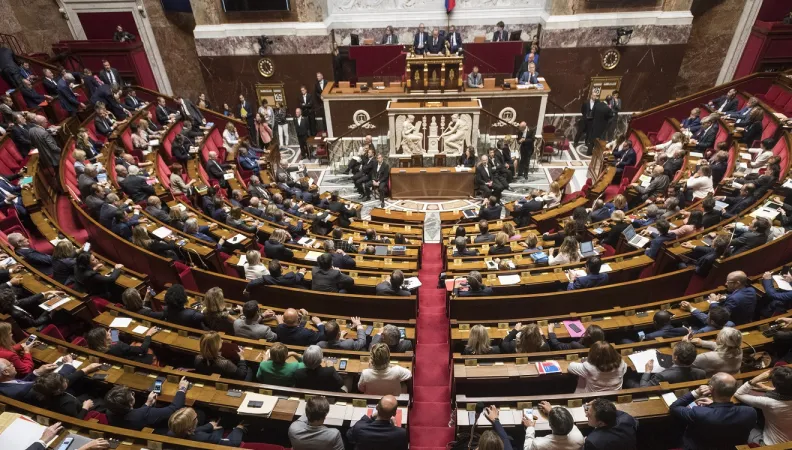Share the page
France Commits to a Major Boost in Overseas Aid
Published on

The French government has charted a new, more ambitious course for its development assistance. Just before the end of the year, France pledged to increase the share of its GDP devoted to overseas aid and to consolidate a fund dedicated to project innovation.
Draft Development Legislation for 2021
Presented to the Council of Ministers on 16 December, the draft bill for Inclusive Development and the Fight against Global Inequalities will be put to a vote in the new year. It's intended to replace the law for Orientation and Planning of Development Policy adopted in 2014. With the new text, France aims to combat inequality more effectively, and provide better protection for the global movement of public goods and services. This revision of France’s international development policy is considered all the more urgent during the current global crisis caused by the Covid-19 epidemic, which has spared no continent.
“With the pandemic, economic, humanitarian and social crises are proliferating. France will honor its commitment to international solidarity,” said French President Emmanuel Macron in a tweet. “The commitment to increase development aid to 0.55% of GDP by the end of our five-year mandate will be kept.”
The draft legislation features several objectives:
- Increase Official Development Assistance: the text provides for an increase to 0.55% of France’s GDP starting in 2022, versus 0.44% today, in line with the commitment made by the French President.
- Focus this aid on the most vulnerable countries and on priority sectors: health, environment and climate, gender equality, education, food security, water management, addressing crises and improving respect for human rights.
- Modernize development assistance and strengthening the evaluation of its effectiveness. This will involve setting up an independent evaluation committee to control the proper use of funds and their impact.
- Overhaul the methods by which development policy is carried out, in the form of a renewed partnership with the countries concerned, in particular in Africa, and with all the development stakeholders in France: civil society organizations, regional and local authorities.
- Strengthen the architecture for the management of development policy, especially State supervision of operators, to ensure tangible results in the field for the people directly affected by global imbalances.
“The current crisis has confirmed our view that it was crucial to maintain this effort for the coming years,” said Jean-Yves Le Drian, Minister for Europe and Foreign Affairs. “This draft law marks a new beginning for us all.”
The bill is expected to be submitted to the National Assembly in the first quarter of 2021.
First Presidential Council for Development
Headed by Emmanuel Macron, the first ever Presidential Council on Development was held on 17 December, and attended by the Prime Minister, Jean Castex, other ministers, AFD Chief Executive Officer, Rémy Rioux, and his counterpart from Expertise France, Jérémie Pellet.
This innovative format, which is planned to be renewed every six months, provides the opportunity to take stock of France’s Official Development Assistance, in terms of the country’s development priorities and commitments as well as upcoming international events. The meeting also marked the first stage in a series of consultations that will lead to the organization of a summit on financing African countries in May 2021.
The health and economic crises unleashed by the pandemic have exacerbated the difficulties faced by most fragile countries, especially in Africa. “For the first time in many years, we’re going to see a rise in poverty in Africa, where the debt of countries has tripled over the last decade”, said the Minister of Economy, Finance and the Recovery, Bruno Le Maire. The World Bank estimates that the pandemic could push around 100 million people into extreme poverty in 2020 and up to 150 million in 2021.
Innovation Fund for Development
The Presidential Council for Development formalized the creation of a Fund for Development Innovation. This €15 million fund will allow teams from research institutes, NGOs, governments and companies to test new ideas, experiment by scaling them up and evaluate the effectiveness of innovative solutions to combat poverty and inequality.
Development economist and winner of the 2019 Nobel Prize in Economics, Esther Duflo, will chair the Fund. “There are a number of promising ideas, policies and programs that may reduce poverty, but it’s only by rigorously testing them that we can identify the ones that actually work,” she said. “Developing scientific evidence…can help us learn lessons from experience and build sustainable solutions that are ready to be rolled out.”
This development approach will open the door to innovations in a wide range of sectors, from health and education to climate change and gender equality. It will also provide new ways to improve access to essential goods and services, process managerial innovations, improvements in public services, development of new technologies or the application of existing technologies.
Le Drian also announced that the Government intended to expand the global deployment of French expertise. International technical experts – some 145 French specialists from the public and private sectors – are deployed all over the world to assist with the implementation of public policies and development projects. Their management is entrusted to Expertise France, which will soon join AFD Group.
